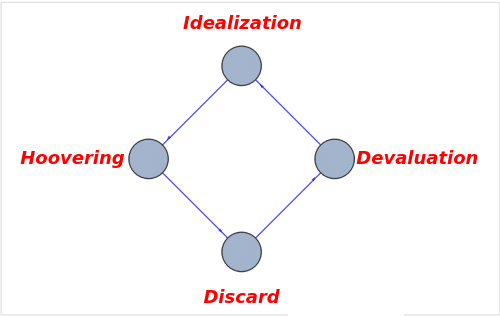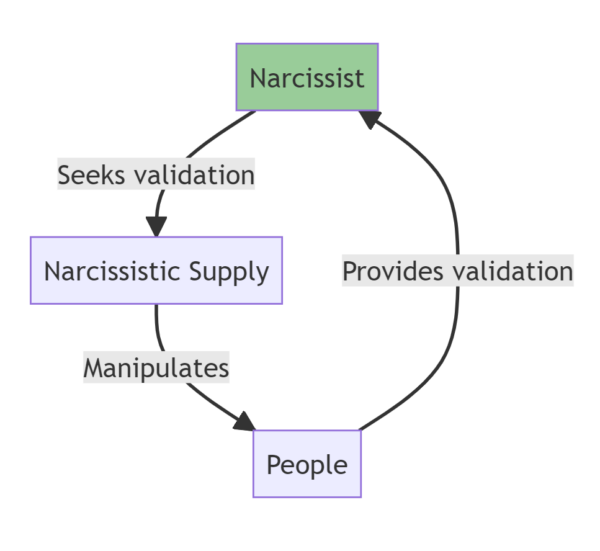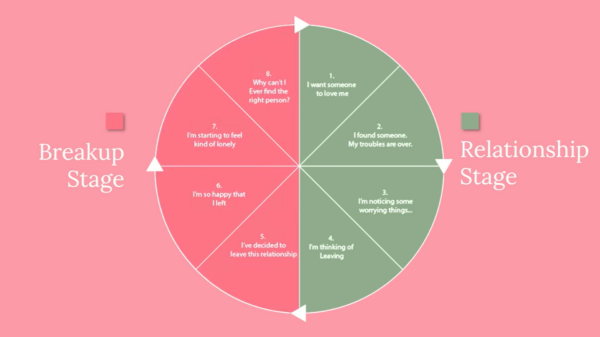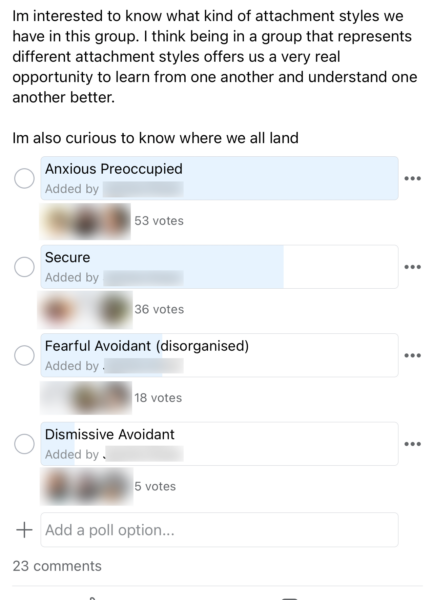Today I want to take an in-depth look at what the average narcissistic ex wants after a breakup.
So, after spending an hour straight thinking through this list I came up with the eight most likely thing an ex who is a narcissist wants from you,
- The Narcissistic Abuse Cycle: By looking at where they are at in this cycle you can get a pretty good idea of what’s going to happen in the future and what they want currently
- Narcissistic Supply Source: In the context of narcissism, “supply” refers to the validation and emotional response they can elicit from others. An ex-partner can be a rich source of this supply.
- A Sense of Superiority: They often want to come out on top, viewing relationships and their ending as a competition. This means they might try to be the one who has “moved on” faster or seems happier post-breakup
- Attention: They may continue to seek attention from their ex-partner, as any form of attention, even negative, can be seen as a validation of their worth.
- To Keep You Co-Dependent: They might actively work to keep the ex-partner emotionally reliant on them, fostering a dynamic where the ex feels incomplete or unstable without the narcissist.
Let’s begin!

What Are Your Chances of Getting Your Ex Boyfriend Back?
Take the quiz#1: The Narcissistic Abuse Cycle
This cycle is probably one of the most commonly referred to graphics when understanding how narcissists operate.
The ultimate question posed here is to determine what a narcissistic ex wants. My initial approach to help someone grasp this is to familiarize them with the Narcissistic Abuse Cycle and its workings.
Theoretically, you could pinpoint where your ex is in that cycle. By doing so, you can understand what they want in the present and anticipate their desires in future moments.
It might be an unconventional way of thinking about it, but let’s delve into the Narcissistic Abuse Cycle to get a clearer picture.
There are four main stages:
- Idealize Stage
- Devalue Stage
- Discard Stage
- Hoover Stage
The Idealize Stage:
In the Idealize Stage, a narcissistic ex wants to flatter you. They’ll shower you with excessive attention to appeal to your emotions. If a breakup occurred in the past, they desire you to forget and be ensnared by the whirlwind of emotions they stir.
They’re essentially looking for a honeymoon phase. This stage is commonly used for potential future manipulation. Their primary objective here is to make you lower your defenses.
The Devalue Stage:
In the Devalue Stage, admiration for you wanes and is supplanted by verbal and emotional abuse. Expect cruel and degrading comments, often masked as jokes or sarcasm.
They’re adept at this, subtly chipping away at your defenses, leaving many victims doubting themselves and with diminished self-esteem. The narcissist’s aim is to degrade you to maintain control. This stage is recognizable by the abundance of harsh remarks.
The Discard Stage:
Next, we have the Discard Stage. Here, your utility to the narcissist diminishes, leading them to end the relationship or shift their attention elsewhere.
An often-overlooked element in the breakup realm is that not all narcissistic supplies are equal. Perhaps the supply they sought from you isn’t as potent as they hoped, leading to the discard.
This phase often involves torment, where they discard you as if the shared love was insignificant.
The Hoover Stage:
Lastly, the Hoover Stage is aptly named after the Hoover vacuum, symbolizing their attempt to suck you back in.

What Are Your Chances of Getting Your Ex Boyfriend Back?
Take the quizThe Narcissistic Abuse Cycle graphic can be confusing because the tactics used to reel you back in during the Hoover Stage often resemble those of the Idealize Stage.
They might lure you back once their supply dwindles, manipulating you with familiar tactics.
#2: Narcissistic Supply
Narcissistic supply is likely the most sought-after commodity for a narcissist.
If you’re unfamiliar, narcissistic supply is essentially the validation, emotional response, or even physical intimacy they can extract from others. An ex often provides a bountiful supply.
Given the shared history, they are aware they can manipulate this individual, become intimate with them, and rely on them as a fallback during tough times. I often explain to my perplexed clients that a narcissist’s worldview doesn’t perceive humans as sentient beings but as sources of supply.
This supply can take various forms:
- Emotional support for some
- Attention or admiration for others
- Physical intimacy for a few
- Companionship during a gym session
- Or merely someone to converse with during a walk.
To the narcissist, individuals are merely vessels to prop up their ego, bestowing them with feelings of power and control.
The concept of supply isn’t everlasting.
It mirrors a drug addict’s pursuit: you seek the hit, revel in the high, but once it wanes, the hunt resumes. For narcissists, people are their drug of choice, one of the primary reasons why reconciling with such individuals isn’t advocated. However, it’s crucial to enlighten clients to recognize if they’re ensnared in such dynamics.
The complexity of narcissists truly surfaces during that Hoover stage I touched upon in section number one.
Take a look at this graphic,
This is how narcissists essentially get their supply. Notice how their manipulation skills are unparalleled.
- They initiate their journey yearning for validation, recognizing their imminent need for narcissistic supply.
- In their quest, they manipulate individuals, deriving validation, which in turn empowers them.
- As this source depletes, their craving resurfaces, instigating another cycle of manipulation and validation.
- This cycle perpetuates indefinitely.
#3: A Sense Of Superiority
For many narcissists, life is a game of winners and losers. Relationships, including their endings, are not exempt from this worldview.
Relationships as Trophies:
To a narcissist, a relationship can serve as a testament to their desirability, charm, and prowess. Consequently, when such a relationship ends, they feel an urge to prove that they remain undiminished and even superior post-breakup. This can be motivated by their internal fears of inadequacy or their need to always present a successful facade.
The Race to Recovery:
For a narcissist, appearing to have moved on faster than their ex is a way of “winning” the breakup. It’s a superficial metric they use to demonstrate resilience, desirability, or superiority. This is why you might see them quickly jumping into new relationships or showcasing their post-breakup life on social media.
Reactive Comparative Behavior:
If a narcissist perceives their ex-partner is doing well or moving on successfully, they might react competitively. They may engage in one-upmanship, attempting to outdo their ex in areas like career achievements, personal growth, or new relationships.
Emotional Impact as a Metric:
A narcissist often gauges their value or superiority based on the emotional impact they have on others. If they can evoke jealousy, sadness, or any intense reaction from their ex, they interpret it as a sign of their lasting influence and power.
Using Others for Validation:

What Are Your Chances of Getting Your Ex Boyfriend Back?
Take the quizPost-breakup, a narcissist might surround themselves with people who bolster their ego and affirm their narrative. These individuals might be new romantic partners, friends, or even acquaintances, and they’re often used to project an image of success and happiness.
Avoidance of Vulnerability:
At their core, many narcissists are terrified of appearing vulnerable or being perceived as weak. They might hide any feelings of sadness, regret, or loneliness after a breakup, overcompensating by presenting an exaggerated image of happiness and contentment.
Rejection and Self-Worth:
A breakup, which is a form of rejection, can be deeply threatening to a narcissist’s fragile sense of self-worth. By appearing superior or happier post-breakup, they’re trying to reassure themselves of their worth and desirability.
In essence, for a narcissist, maintaining a sense of superiority post-breakup is less about the actual happiness or well-being and more about image management and self-preservation. They are often driven by internal insecurities and a deep-seated fear of inadequacy, which they mask with a veneer of confidence and success.
#4: Attention
For a narcissist, attention is more than just acknowledgment—it’s a potent drug that affirms their sense of self-worth and importance. The craving for this attention often doesn’t dissipate after a relationship ends.
In the aftermath of a breakup, they might find themselves in a vulnerable position, feeling a void where the constant validation once was. To fill this emptiness, they may continue to seek out attention from their ex-partner.
This is similar to what we see happen in the avoidant death wheel concept.
If you aren’t familiar this is the avoidant death wheel,
Right around stage seven is when an avoidant typically starts to feel loneliness and depression. That’s when they are most likely to reach out to you. It doesn’t always happen 100% of the time but the important part is it does happen.
Of course, when a narcissist starts to feel lonely and depressed what do they do?
They seek attention. Even if this attention comes in the form of arguments, confrontations, or negative interactions, it still serves a purpose for the narcissist.
Negative attention, in their view, is still a form of engagement, a tangible proof that they remain significant in their ex’s life. It reaffirms that they have the power to evoke strong emotions and reactions.
In essence, for the narcissist, any form of attention, whether it’s filled with love, anger, or despair, validates their importance and keeps them tethered to a sense of superiority and relevance.
#5: To Keep You Co-Dependent
It’s a fascinating dynamic; reflecting upon the narcissistic abuse cycle I previously discussed, both the narcissist and the codependent individual remain entrapped in their respective roles.
From our extensive experience at Ex-Boyfriend Recovery, we’ve observed a recurring pattern: many of our clients display anxious attachment styles. Polls reinforce this observation.
Such individuals often have an inherent codependent nature, measuring their self-worth based on their ability to please others.
Their identity becomes inextricably linked to their relationship, which ideally should not be the case. Yet, this trait makes them an enticing prospect for a narcissist. The ability to exert consistent control and establish unwavering codependency is almost a siren call for narcissists.
Navigating the treacherous waters of the narcissistic abuse cycle is especially perilous for a codependent.
- The idealization phase lifts them, only to be harshly dropped during the devaluation phase. They’re left questioning their worth.
- Following the discard phase, their gravest fears materialize, only for the narcissist to reel them back in during the hoovering phase.
- This repetitive cycle reinforces the codependent’s belief that they are the issue, allowing the narcissist to further gaslight and manipulate them.
Ultimately, a narcissist craves a partner who is emotionally tethered to them, yearning for their validation, and feeling perpetually incomplete without their presence. Such dependency allows the narcissist easier control and a reliable source for their narcissistic supply.
Interestingly, when someone begins to break free from their codependent shackles and exhibit signs of personal growth and independence, a narcissist’s alarm bells start ringing.

What Are Your Chances of Getting Your Ex Boyfriend Back?
Take the quizThey sense the shift and, in response, might intensify their efforts to pull the individual back into the cycle, often employing even harsher devaluation tactics to regain control.
In essence, a narcissist might covet one thing above all else: to sustain your codependency, making manipulation more effortless and maintaining their dominance.




